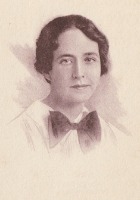Zora Bernice May Cross
Zora Bernice May Cross Poems
What have you got in your knapsack fair,
White moon, bright moon, pearling the air,
Spinning your bobbins and fabrics free,
Fleet moon, sweet moon, in to the sea?
...
Late, late last night, when the whole world slept,
Along to the garden of dreams I crept.
And I pulled the bell of an old, old house
Where the moon dipped down like a little white mouse.
...
And then came Science with her torch red-lit
And cosmic marvels round her glowing head—
The primal cell, the worm, the quadruped—
...
It’s holiday time on the hollyhock hills,
And I wish you would come with me laddie-love, now,
The butterfly-bells, from the Folly-fool rills,
Will ring if you listen, and drop on your brow.
...
Oh! Bury me in books when I am dead,
Fair quarto leaves of ivory and gold,
And silk octavos, bound in brown and red,
That tales of love and chivalry unfold.
...
What have you more than I, who crave you so?
Have I not hands and feet and thoughts to tell?
All my sweet senses and fine dreams that swell
...
My true mind makes as many loves of you
As my full heart contentedly can hold.
And when the one grows dull, the other cold,
...
Dame Fortune’s jade with a fanciful horn
Of silver ambitions she warns of the flame;
With pearls for the princes and tears night and morn
For poor little poets who fluttered for fame,
...
Love, you have brought to me my perfect soul,
More sweet than earthly things, more precious rare,
Hiding its fragrance in my loosened hair
...
In me there is a vast and lonely place,
Where none, not even you, have walked in sight.
A wide, still vale of solitude and light,
...
Love is the sepulchre of all my sin,
If it be sin to let the body sink
In that slow dying the sick senses drink
...
I cannot find a fault in you; and yet
I think you are not perfect many ways.
I have seen lips more meet for maiden praise
...
Dearest, your mother feels (though dead) this birth—
Laughs at the fire within your shining eyes—
Your eyes, yet mine, wherein such glory lies
...
I would not curse your England, wise as slow,
Just as unjust in deed.
I can believe that from her heart may flow
...
My mind and heart both love you utterly.
And so each thought of mine is doubly yours,
And all my will about your body pours
...
If there should be a moon above the hill
To-night, dip down with me into the sea
Of our first passion, and, with naked glee,
...
Dearest, there is no part of us, but air
And earth are counterparts. Your fragrant eyes
Touching my own, some essence of the skies
...
Give me a child!! Dear Heart, we have loved long,
Draining each other’s sweetness to the last
Wild drops of honeyed madness falling fast
...
Do not surcharge our souls with that vile blame
To which our bodies are subjected here;
Nor heap them with the horror of dull fear
...
I walked among the flowers that bend their heads
Low to the earth and back again to light,
Hearing them prattle of their blue and white—
...
Zora Bernice May Cross Biography
Zora Bernice May Cross was an Australian poet, novelist and journalist. She was born in Brisbane, and was educated at Ipswich Girls' Grammar School and then Sydney Teachers' College. She taught for three years and then worked as a journalist, for the Boomerang and then as a freelance writer. After the failure of her first marriage she eventually lived in a de facto marriage with David McKee Wright. Zora'a first book of poetry, A Song of Mother Love, was published in 1916. Songs of Love and life, a collection of love poetry thought at the time to be rather too frank, but which proved popular enough to appear is several editions, followed in 1917. The 1920s saw the continuation of war poetry, both celebrating the exploits of the fighting men and lamenting the realities of war. Zora Cross’s Elegy on an Australian schoolboy, a poem about her young brother who was killed in the war, is an example of the latter. She is best-known for her 1917 book, Songs of love. She was known not only for her poems, including sonnet sequences, but for a private life scandalous by the standards of her time. She wrote about sex, childbirth and war, in terms also considered too explicit by contemporaries. As Bernice May, she wrote a regular column in the 1930s for the Australian Women's Mirror. It comprised interviews with women writers. Zora Cross died in the Blue Mountain region of New South Wales in 1964.)
The Best Poem Of Zora Bernice May Cross
The New Moon
What have you got in your knapsack fair,
White moon, bright moon, pearling the air,
Spinning your bobbins and fabrics free,
Fleet moon, sweet moon, in to the sea?
Turquoise and beryl and rings of gold,
Clear moon, dear moon, ne’er to be sold?
Roses and lilies, romance and love,
Still moon, chill moon, swinging above?
Slender your feet as a white birds throat,
High moon, shy moon, drifting your boat
Into the murk of the world awhile,
Slim moon, dim moon, adding a smile.
Tender your eyes as a maiden’s kiss,
Fine moon, wine moon, no one knows this,
Under the spell of your witchery,
Dream moon, cream moon, first he kissed me.
Zora Bernice May Cross Comments
Too Victorian. I'm turned off by overusage of maidens and fairies in poetry.

I would like to find the date that Zora Cross wrote " Memory" , " Late, late last night when the whole world slept"